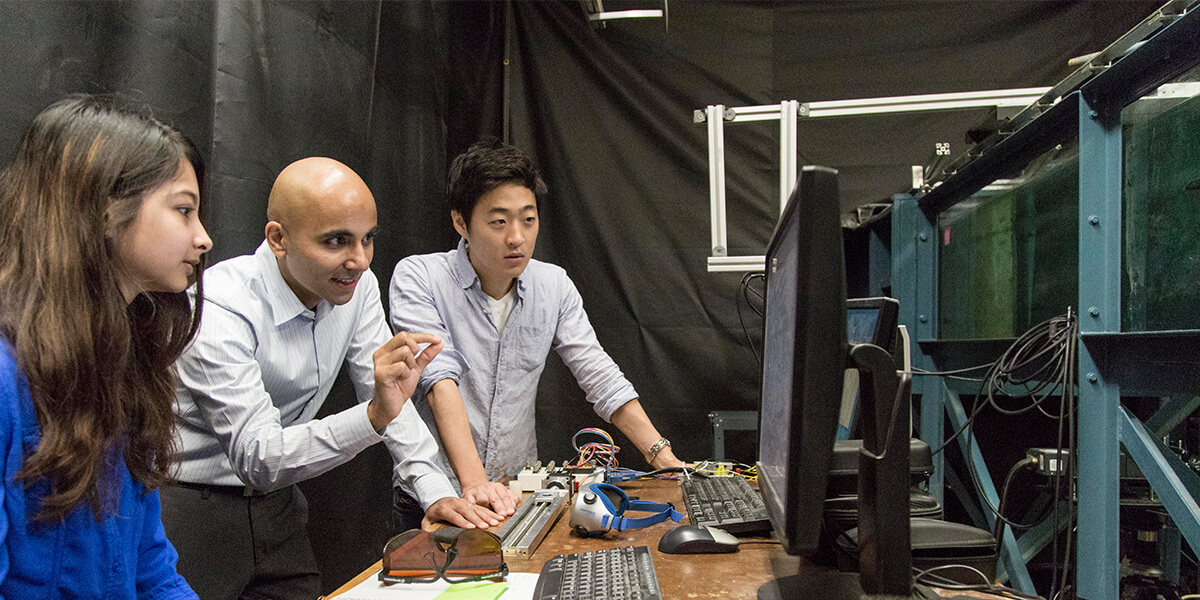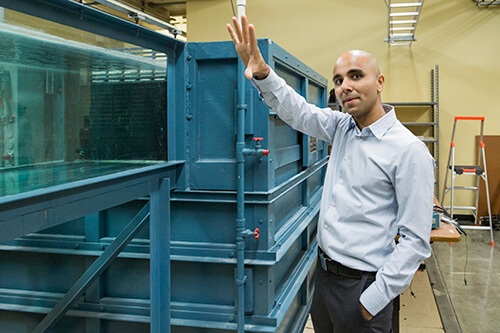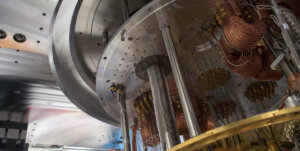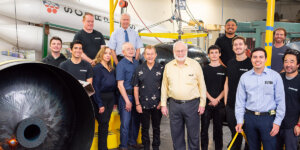
Mitul Luhar and students review experimental data from the Blue Water Channel
Anyone who’s ever taken a class in fluid mechanics with Mitul Luhar will recognize him as one of those gifted professors whose skill in teaching and communication is commensurate with their own love of research. As Henry Salvatori Early Career Chair and Associate Professor of Aerospace and Mechanical Engineering and Civil and Environmental Engineering, Luhar leads the Fluid Structures Interactions Lab and is often to be found in the Viterbi “Fabulous Fluids Facility,” assisting students with experiments in the Blue Water Channel and the (legendary) Dryden Wind Tunnel.
Luhar’s excellence has now been recognized by his appointment to the New Voices program led by the National Academies of Sciences, Engineering and Medicine. Intended to bring an influx of new thinking to the advisory work conducted by National Academies, the program is uniquely placed to influence public policy; members of previous New Voices cohorts have served on study committees, developed workshops, generated guidelines for the future of STEM education and engaged with federal agencies. In the past two decades, the National Academies have put together several ground-breaking and impactful studies on climate change and decarbonization, artificial intelligence, patient safety and reducing child poverty.
Over the next two years, Luhar will collaborate with other emerging leaders in STEM to address national and global challenges. We caught up with him to chat about his current research and his goals for New Voices.
Firstly, congratulations! What will your membership of New Voices in Sciences, Engineering and Medicine involve?

Luhar alongside the hydraulic model of the LA River installed in the City of Los Angeles’s Hydraulic Research Laboratory
Thank you! It will be a privilege to be closely involved in the endeavors of National Academies over the course of my two-year term. The specifics of my duties are still to be developed, since each New Voices cohort gets to set its own agenda. However, there are a few key issues that I am particularly passionate about: climate change mitigation and adaptation (focusing on issues impacting Southern California), as well as STEM education and international collaboration.
What are some of the problems you are currently grappling with in your lab?
The two components of our research involve the minimization of the environmental impact of large-scale transportation systems (e.g., by making shipping, aviation and pipeline transport more efficient) and making our natural and built infrastructure more climate resilient (e.g., by addressing how river re-naturalization affects flood risk and evaluating nature-based solutions to coastal protection). One example of this is my work with a transdisciplinary team that is currently developing research, education and community outreach programs related to the revitalization of the Los Angeles (LA) River.
The first theme aims to reduce the drag generated on ships and airplanes, and inside pipes. Even a small reduction in drag has the potential to substantially reduce energetic expenditures and emissions from the transportation sector. The second theme aims to evaluate the efficacy of nature-based solutions to coastal protection and river revitalization projects, which have the potential to make our coastlines and rivers more functional and climate resilient. These research efforts combine computational modeling as well as laboratory experiments, both of which can be technically challenging in different ways.
The projects described above are impactful in terms of advancing our understanding of complex physical processes important in natural and engineered systems. Moreover, such academic research projects are also essential to training the next generation of scientists and engineers.
Why were you selected for the role – what made your candidacy stand out?
I believe the New Voices program selects candidates based both on technical expertise and service leadership.
My prior work has been recognized via several prestigious early career awards from the Air Force Office of Scientific Research and the National Science Foundation, as well as inclusion in the National Academy of Engineers “Frontiers of Engineering” community for early-career scientists and engineers.

Luhar describes features of the Blue Water Channel experimental facility.
Perhaps most important when it comes to my inclusion in the New Voices program, I have dedicated time and effort to service at all stages in my career. As a postdoctoral scholar, I served as Chair for the Caltech Postdoctoral Association and helped create a recurring annual program of career development events, teaching and mentoring workshops, as well as networking and social activities. Since joining USC, I have mentored trainees at all levels (high-schoolers, undergraduates, M.S. and Ph.D. students, postdocs) as well as more junior faculty colleagues. I currently serve on the Board of Advisors for the STEM Academy of Hollywood, a high-needs public school within the LA Unified School District. At the national level, I have led education, outreach and mentoring efforts for multiple professional societies.
What are your specific/personal goals for the coming year in relation to the wider goals of the institution?
The New Voices program provides an opportunity to move beyond my immediate sphere and see how my work fits within a broader scientific and societal context.
Moving forward, I want to build on my expertise and experience to have a greater impact on public discourse and science policy, particularly in the realm of climate change and STEM education. I am hopeful that increased exposure to the policy advisory process and international science diplomacy efforts will give me a big picture perspective that I can bring back to my research and teaching.
I’m looking forward to contributing to the International Conference for Young Scientists to be held in May 2024, which is centered around the theme of “Transformative and Inclusive Science for a Sustainable Future”. The conference is being organized by the Global Young Academy with support from the National Academies New Voices program, and it’s a great initiative for learning more about the STEM collaboration and science diplomacy efforts being led by science, engineering and medicine academies around the world.
Finally, I am very excited for the opportunity to work with and learn from like-minded colleagues in the New Voices cohort who want to amplify their impact. It’s an important threshold for all of us!
Published on February 20th, 2024
Last updated on February 20th, 2024













